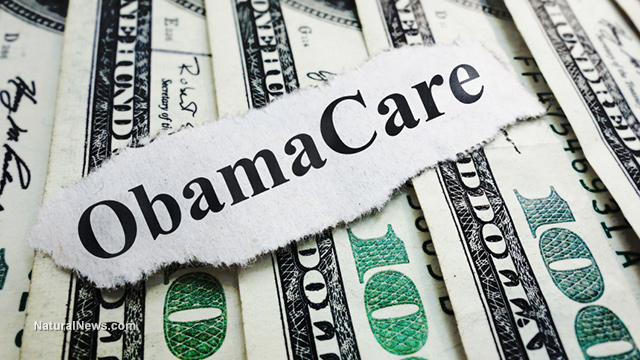Obamacare system in 'insurance death spiral' warns Texas Governor; total implosion now inevitable
Sunday, August 21, 2016 by: J. D. Heyes
Tags: Obamacare, death spiral, single payer system

(NaturalNews) He may not be a physician or corporate insurance executive, but Texas Gov. Greg Abbot is astute enough to understand a failing business model – and government policy – when he sees one.
Commenting on health insurance giant Aetna's recent decision to pull out of most Obamacare-created health insurance exchange markets after losing more than $430 million since 2014, Abbott, in a tweet, noted the obvious:
Commentary: Aetna's Obamacare pullout means the 'insurance death spiral' has arrived. Program is losing billions.
Indeed it has, and that was predicted. In fact, in 2014 we reported that Obamacare exchanges were already bleeding red ink, and that the entire concept behind the law – that young, healthy Americans would sign up in droves and thus offset the cost of caring for older, sicker Americans – was premised on a fallacy.
First and foremost, despite the fact that the law unconstitutionally requires Americans to purchase health insurance (regardless pf what the U.S. Supreme Court ruled), tens of millions of younger Americans are still not buying coverage, according to a May Modern Healthcare report. Part of the reason for that is because younger people tend to feel "invincible," so health insurance is not viewed as an absolute necessity.
Designed to fail
But another major factor is the cost: Despite being lied to by President Obama repeatedly that his signature "healthcare reform law" would lower premiums by about $2,500 a year, costs have instead gone up, as insurers are also forced to a) provide 'basic' care plans; and b) have to rely on older, sicker patients for most premiums.So, without massive economic participation by younger Americans, the "death spiral" of the law has begun in earnest, as we see more and more insurers pulling out of the markets because they are losing big, big money. Aetna is not alone.
Another major health insurer, UnitedHealth, initially jumped into the Obamacare exchange markets like Aetna and others because, after all, if you have a president and Congress mandating that every American be forced to buy your product, why wouldn't you? But as we have seen, things did not work out as the insurers expected, and UnitedHealth, more so than Aetna, has found out the hard way.
The company began bleeding money early on. After evaluating early claims by sicker than expected (and thus costlier to cover) enrollees in the exchanges, the company backed off its initial rosy fiscal projections. Like other health insurers, UnitedHealth was forced to raise premiums and cut some plan designs, Modern Healthcare reported – even while still trying to put on a happy face.
"We continue to expect exchanges to develop and mature over time into a strong, viable growth market for us," Dave Wichmann, UnitedHealth's second-in-command, said last October.
The end game is to get rid of ALL private sector health coverage and make it government-run
But the optimism was short-lived. Just a month later, the company totally trashed all expectation of the future of the exchanges after confirming it had lost $1 billion on its Obamacare plans, then threatened to pull out of the exchanges altogether. In April of this year, UnitedHealth began sending out notices that it will leave most of the marketplaces and remain only in a "handful" for the coming year.But while the failure of the plans – and Obamacare in general – was predicted by some, was it also inevitable – as in, was it designed to fail for some greater purpose, such as to give big government socialists the grounds to propose a total takeover of healthcare, like British- and Canadian-style systems that under-serve populations and are chronically underfunded?
Yes. And that comes straight from the man who twisted Senate rules to get the law passed in the first place: Then-senate majority leader, Harry Reid, D-Nev.
In 2013, in a moment of unusual candor, Reid admitted to a newspaper reporter that the end-game for U.S. healthcare is a socialist single-payer system, a sort of Medicare-for-all scheme that will be insanely expansive, with care meted out and limited by government bureaucrats, not doctors and other primary care providers.
"What we've done with Obamacare is have a step in the right direction, but we're far from having something that's going to work forever," Reid said. When he was asked if the goal was to get rid of private-sector insurance coverage altogether, Reid said, "Yes, yes. Absolutely, yes."
Sources:
ARSTechnica.com
YouTube.com
DailySignal.com
ModernHealthcare.com
Yahoo.com
Obamacare at FETCH.news
Get independent news alerts on natural cures, food lab tests, cannabis medicine, science, robotics, drones, privacy and more.
Take Action: Support Natural News by linking to this article from your website
Permalink to this article:
Embed article link: (copy HTML code below):
Reprinting this article:
Non-commercial use OK, cite NaturalNews.com with clickable link.
Follow Natural News on Facebook, Twitter, Google Plus, and Pinterest
- European Court of Justice: Healthcare professionals who promoted or administered COVID-19 vaccines are CRIMINALLY LIABLE for any harm caused
- Cinnamon plays a critical role in diabetes management
- FRAUD ALERT: Details DEMOCRATS do NOT want you to know about the $40 BILLION wasted on Fed-loaded credit cards cancelled by DOGE
- Scientists unveil breakthrough method to eliminate "Forever Chemicals" from water, transforming waste into graphene
- Newly released JFK files reveal Pentagon's role in creating Lyme disease and covid in the same lab
- Postcard from 1875 highlights smallpox vaccine’s failure: Lessons for today’s COVID-19 response
- Massive egg substitution recall: Bleach contamination sparks nationwide concern
- AI-powered forecasting model proves more accurate than traditional systems at predicting the weather
- Oncologist warns of ‘terrifyingly aggressive’ cancers in children, linked to immune suppression from COVID vaccines
- Preparing for the unthinkable with William Brocius’ “How to Survive the Death of the Dollar”
- Science proves PASSION FRUIT is a powerful medicine for the GUT and the HEART
- When antibiotics are unavailable, natural ANTIMICROBIAL compounds become essential first line defenses against infection
- The NIH reckoning: Battling censorship and restoring free speech in health research
- EPA reconsiders Obama's CO2 “Endangerment Finding” - could unleash American energy freedom
- Israel's war on Gaza's healthcare: Over 1,400 medical workers killed in attacks
- Israeli forces execute Gaza medics, bury them in mass grave in Rafah
- Exclusive: Microscopic analysis suggests unknown biological contaminants falling from the sky
- Nature's cold-fighting arsenal: Immune-boosting foods and healing recipes you need now
- Newly released JFK files reveal Pentagon's role in creating Lyme disease and covid in the same lab
- Kiss Your Genetic Privacy Good-Bye! 23andMe Gets Green Light to Sell Your Intimate Genetic Details to Anyone They Want
- Oncologist warns of ‘terrifyingly aggressive’ cancers in children, linked to immune suppression from COVID vaccines
- Analysis: The coming economic collapse, a mass uprising and Trump's three secret weapons to halt the growing revolt
- European Court of Justice: Healthcare professionals who promoted or administered COVID-19 vaccines are CRIMINALLY LIABLE for any harm caused
- Dr. Suzanne Humphries makes bombshell appearance on Joe Rogan podcast, exposing vaccine industry deception back to POLIOMYELITIS
- Woman contracts WORLD'S DEADLIEST VIRUS after unknowingly being given the WRONG VACCINE
- NIH study, buried for decades, reveals that Flu Shots INCREASE elderly deaths, not prevent them
- Sugar-free deception: Artificial sweeteners hijack hunger signals, fuel obesity epidemic, study warns
- CDC finally halts $11 billion COVID funding scam as health officials admit the ‘pandemic’ was a fraud
- AI weather model outperforms traditional forecasts, boosts accuracy by 20%
- Black cumin seed oil emerges as a powerful ally against breast cancer and chronic inflammation
- Musk targets “strangely wealthy” lawmakers in DOGE probe, names Pelosi, McConnell, Schumer
- COVID-19 scandal linked to CANCER SURGE: Billionaire researcher sounds alarm
- “Independent” anti-Russia outlet MEDUZA faces COLLAPSE as US funding dries up
- The Health Ranger releases “Vaccine Zombie” song and music video, using AI-animated zombies for the music video
- DARPA: The shadowy innovator behind the world’s most advanced military technologies
- Britain’s descent into police state censorship: Parents raided for questioning their daughter’s school system online
- Newly released JFK files reveal Pentagon's role in creating Lyme disease and covid in the same lab
- California's social media censorship law struck down: A victory for free speech or a threat to online safety?
- EPA advisor admits the agency is funneling billions to climate groups ahead of Trump’s return to White House
- The Health Ranger releases “Vaccine Zombie” song and music video, using AI-animated zombies for the music video
- Dr. Mike Yeadon releases 15-minute testimony - WATCH - about genocidal intent of COVID “vaccines”
- Florida takes a stand: DeSantis proposes permanent ban on mRNA vaccine mandates
- Mike Adams releases country western hit single: Goin’ Back in Time is Comin’ Home
- Rep. Nancy Mace introduces bill to ban biological males from female facilities on federal property
- Unpacking the Lies That We’ve Been Fed – new song and music video released by Mike Adams, the Health Ranger
- “Why we influenced the 2020 elections”: Facebook files reveal the coordinated effort to bury the Hunter Biden laptop story
- House Intelligence Committee calls for the ARREST and PROSECUTION of Dr. Anthony Fauci
- Sugarcane extract superior to cholesterol-lowering drugs?
- The pandemic as a tool for INDOCTRINATION: Understanding “The Indoctrinated Brain” by Dr. Michael Nehls
- Survival 101: Effective EMF blocking techniques
- Mike Adams releases music poetry sensation: A Child of God
- Peter Rost exposes Big Pharma corruption in his book “The Whistleblower: Confessions of a Healthcare Hitman”
- Migrants are taking advantage of recent hurricanes to scam residents and loot their homes
- Michigan sheriff announces criminal investigation into 2020 election crimes, Dominion Voting Systems
- Red Cross issues warning to stop blood plasma donations from vaccinated people
- Scientists confirm: GENIUS brain function can be spontaneously unleashed in humans without any apparent cause
- EPA advisor admits the agency is funneling billions to climate groups ahead of Trump’s return to White House
- HYSSOP: What research reveals about the health benefits of this ancient holy herb
- Two containers with completed ballots fall out of truck in Florida
- Fully vaccinated about to see “tsunami” of illness and death, warns virologist
- Global leaders unite to clamp down on “misinformation” with UN-backed Cascais Declaration
- BREAKING: 2025 NDAA authorizes mandatory military draft of WOMEN across America… as Pentagon pursues global NUCLEAR war with both Russia and China at the same time
- Michael Yon warns of a ZIONIST TAKEOVER in Trump’s second administration
- Ozempic and Wegovy weight loss drugs are injectable LIZARD VENOM PEPTIDES that may unleash a devastating wave of organ failure… side effects align with symptoms of SNAKE BITES
- BOMBSHELL: DNA testing kits are a SCAM to develop ethnic-specific bioweapons
- Israeli soldiers accused of even more torture and abuse in the West Bank
- These 13 countries just signed an agreement to engineer a global FAMINE by destroying food supply
- NASA admits that climate change occurs because of changes in Earth’s solar orbit, and NOT because of SUVs and fossil fuels
- Newly released JFK files reveal Pentagon's role in creating Lyme disease and covid in the same lab
- RFK Jr. clears key hurdle: Sen. Susan Collins backs controversial HHS nominee, signaling a new era for health policy
- Sermon 30: How Jesus reveals Caesar’s FAKE CURRENCY and FALSE AUTHORITY
- Coriander seeds: Ancient medicine backed by modern science
Science News & Studies
Medicine News and Information
Food News & Studies
Health News & Studies
Herbs News & Information
Pollution News & Studies
Cancer News & Studies
Climate News & Studies
Survival News & Information
Gear News & Information
News covering technology, stocks, hackers, and more



"Big Tech and mainstream media are constantly trying to silence the independent voices that dare to bring you the truth about toxic food ingredients, dangerous medications and the failed, fraudulent science of the profit-driven medical establishment.
Email is one of the best ways to make sure you stay informed, without the censorship of the tech giants (Google, Apple, Facebook, Twitter, YouTube, etc.). Stay informed and you'll even likely learn information that may help save your own life."
–The Health Ranger, Mike Adams












































